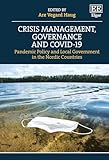Crisis management, governance and COVID-19 : pandemic policy and local government in the Nordic Countries / edited by Are Vegard Haug.
Publisher: Northampton : Edward Elgar Publishing, 2024Description: 272 pISBN:- 9781035336524 (hbk.)
| Item type | Current library | Status | Barcode | |
|---|---|---|---|---|
 Open Access Books - Publishers
Open Access Books - Publishers
|
National Law School | Available | OABP643 |
Preface xvi
Acknowledgments xvii
List of abbreviations xviii
PART I INTRODUCTION, HEALTH CONSEQUENCES
AND LEGAL POLICY
1 COVID pandemic and the Nordic model of local
governance – high stakes, high risks 3
Are Vegard Haug and Harald Baldersheim
2 How severe was the COVID-19 pandemic in the Nordic
countries? 17
Kristian Heggebø and Axel West Pedersen
3 Legal framework and rule of law 28
Iris Nguyên Duy and Sigrid Stokstad
PART II NATIONAL POLICY CHOICES
4 Denmark – centralised crisis management and loyal
implementation 52
Søren Kjær Foged and Kurt Houlberg
5 Iceland: COVID-19 handling strategy in Iceland:
centralised and expert-led 60
Grétar Thór Eythórsson
6 Sweden: relaxed crisis management 68
Fredrik Garcia, Erik Järnland, Johan Nordensvärd,
Carl-Johan Sommar and Elin Wihlborg
7 Finland: prepared yes, but sufficiently agile? 77
Sebastian Godenhjelm
8 Norway: decentralised crisis management 86
Harald Baldersheim, Are Vegard Haug, Linda Hye, and Morten Øgård
9 The Faroese COVID-19 response: testing and soft law 97
Jens Christian Svabo Justinussen and Rógvi Olavson
10 Greenland 105
Maria Ackrén
11 The Åland Islands 113
Maria Ackrén
PART III LOCAL DEMOCRACY
12 The chain of municipal governance in crisis 122
Sebastian Godenhjelm and Maria Ackrén
13 The communicative climate: municipal leaders’ experiences 132
Johan Nordensvärd Carl-Johan Sommar and Elin Wihlborg
14 Civil society: a resource for local crisis governance? 142
Are Vegard Haug, Johan Nordensvärd and Elin Wihlborg
15 Multi-level governance: a helping hand from the state, or
centralisation of crisis responses? 153
Harald Baldersheim and Are Vegard Haug
PART IV CRISIS MANAGEMENT AT THE LOCAL LEVEL
16 Who contributed and to what extent? 166
Kurt Houlberg and Søren Kjær Foged
17 Leadership at the apex in times of crises: Who is running
the show? 178
Linda Hye and Morten Øgård
18 Keep a distance – go online! Digitalisation for crisis
responses and its lasting consequences 189
Elin Wihlborg, Fredrik Garcia and Are Vegard Haug
19 Modes of local crisis management: is there a Nordic model? 198
Linda Hye and Morten Øgård
PART V THE CITIZENS’ ‘JUDGEMENT’
20 How (un)reasonable were the pandemic measures
according to citizens? 209
Are Vegard Haug, Harald Baldersheim and Therese Sefton
21 Citizen trust in local government in the Nordic Countries
during the COVID-19 Pandemic 219
Harald Baldersheim, Are Vegard Haug, Grétar Thór Eythórsson
22 Conclusions and implications 234
Are Vegard Haug and Harald Baldersheim
"This topical book presents a bottom-up perspective on the crisis management, policies, organisation and functioning of democracy across five Nordic countries during the COVID-19 pandemic. Based on a four-year comparative study of Denmark, Finland, Iceland, Norway and Sweden, it considers the divergent local and regional management strategies employed as the crisis unfolded. Chapters consider how the pandemic jeopardised the Nordic countries' high levels of decentralisation and citizen trust in government institutions, and the devolution of functions to local government. They explore the severe and restrictive measures employed to control the spread of the virus, and whether these evolving regimes respected civil rights and the principles of subsidiarity and proportionality. Brought together under the overarching perspective of institutional polycentrism, the book draws on a variety of theoretical strands, including theories of multi-level governance, crisis management, and organisational dependency. With empirical data, population and leader surveys and country case-studies, it presents the experiences of Nordic citizens and examines whether their trust in government was sustained or eroded. International in scope, this book is invaluable for students and scholars of regulation and governance, public administration, public health policy, and comparative politics. Its examinations of regulatory and legal frameworks will also prove useful for policy advisors working in public health and crisis management"-- Provided by publisher.
There are no comments on this title.
